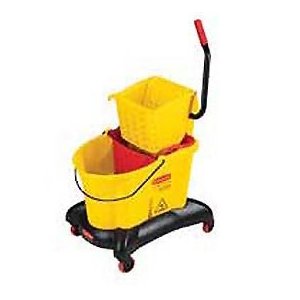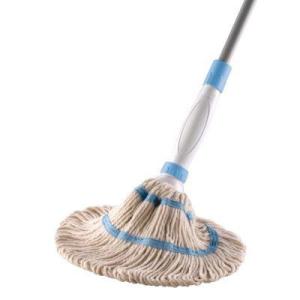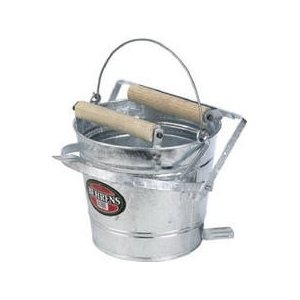I am not what you would call an active “cleaner.”
I’m a tidier. I’m an organizer. But, it takes a lot to move me into cleaning mode.

In my head I always look this adorable while I am cleaning. I may or may not also always wear that hat.
I have a certain fear of activating that particular urge, possibly because I come from a line of hard-core OCD scrubbers. Much as Bruce Banner turns from nerd to Hulk, when my inner-cleaner is invoked I go from laid back dude to my grandmother. I become intent on vacuuming the floor every time someone leaves the room to get a drink – vacuuming it until it is safe to eat mashed potatoes right off that rug.
E has learned to let that particular sleeping OCD monster lie on most occasions, because getting me involved in day-to-day cleaning is the nuclear option. The one time I have been entrusted with cleaning a bathroom the result resembled a demolition project.
The one area where E is willing to deploy the nuclear strike that is my genetic heritage of clean-freak-ness is mopping. I like a floor to be so well-mopped, so gleaming with elbow-greased shine, that you dare not mar the surface with your shadow after the mopping is done. I don’t trust other people to mop for me, because they don’t employ the five key phases of mopping required for a truly gleaming floor.
To say that I was invested in our mop purchase for the new house would be an understatement. “Invested” implies a degree of detached evaluation. No, our mop purchase was a matter of life or death – life with gleaming floors, or the relative half-life of dull ones.
At one point I was reduced to near tears in the middle of an aisle in Home Depot, wracked with indecision and guilt. Couldn’t we buy a sampling of four or five mops to do our own comparative test across multiple surfaces?

The Rubbermaid Wavebrake® Dual-Water Combo with Sideward Pressure Wringer. Wavebreak? For real? It's a fucking mop cart, not a jet ski.
A test should not have been required. What I wanted was a rag mop with a solid wooden handle, and a bucket to wring it with and in. was the ultimate mop because of its heavy metal handle, thick sponge, and heavy-duty wringer. Then I discovered that tiny screws hold said sponge onto the mop, and they get pretty rusty – to the tune of an hour or two to change the head. That was the end of that particular love affair.) –>
Home Depot has a wide, pleasing selection of wooden handled mops. What they had zero of were wringing buckets. They had one massive $100+ dollar custodian cart that came with its own “Caution: Wet Floors” sign in dual languages. I am a serious mopper, so the concept intrigued me, but I didn’t think the cart cornered well enough to get around the island in our kitchen.
Apparently wringing buckets are a rare item, which puzzles me seeing as non-wringing mops are pretty damned common. How do they get dry? Some Amazon shopping yielded the Behrens 412W Galvanized Mop Wringer Pail, but with shipping it totaled almost $40. Seriously? For a mop bucket?
As a result, I committed the cardinal sin of a committed mopper – I bought a plastic handled mop with a built-in wringer. I figured it could last me through three or four moppings – long enough to find a permanent solution.

This is the Quickie Home-Pro Twist Mop with Spot Scrubber. It is the devil.
I was wrong. Super wrong. I popped the wringer out of its plastic threading on my first wring. I began to wring six or seven times to get it dry during phases two and four, which caused the mop head to age six or seven times as fast, which resulted in a busted mop head on its second outing.
$20 dollars for two moppings. I know MY mopping skills are worth $10 a go (hello – I have FIVE PHASES), but I don’t know if the mop quality was equally as worthy.
This all came to a head on Sunday night. I had avoided mopping our kitchen since the mop gave up the ghost, but I caused a bottle of ginger salad dressing to explode across our entire kitchen. Spot-cleaning was not an option – this required mopping.
I dealt with the frustration of my devil mop for all of five minutes. So do you know what I did? Scrubbed the damn floor on my hands and knees. And dried it that way too.
I know I’m my grandmother’s child when I comes to clean floors, but is scrubbing by hand seriously my best recourse with all of the cleaning products in a Home Depot and across the internet at my disposal?
Should I really be having in-store panic attacks and 1000-word blog posts both on the topic of mops?
Am I missing some incredibly simple explanation about how mops get wrung? Do people wring with their bare hands (eewwwww)?
More importantly, what simple home cleaning or repair task drives you similarly up a wall? Please tell me I’m not alone in my insanity.

When I saw the topic of this post, I saved it until I had time to really read and absorb it. Then I didn’t even get to learn the five phases! Personally, I’m a hands and knees mopper. I like to scrub every little corner.
The five phases are:
1. Sweep
2. Wet Mop (emphasis wet)
3. Scrub (hopefully #2 took care of easy dirt)
4. Polish (a less wet round to clear suds)
5. Shine (either dry mop or with damp cloth)
I would agree on the wooden handle mops, they are far more reliable than the plastic ones. Even the plastic handled buckets seem to fail miserably in terms of durability. In my personal opinion, using plastic is just a waste of money and it is not safe for the environment too.